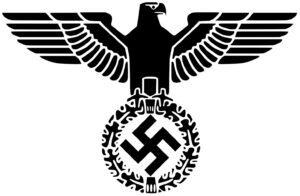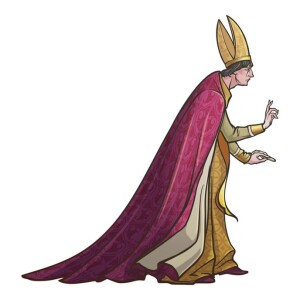Saving democracy is a Catholic imperative
By Robert Fontana

By RsVe, corrected by Barliner. – File:Reichsadler Deutsches Reich (1935–1945).svg, Public Domain, https://commons.wikimedia.org/w/index.php?curid=27421526
Catholicism does not have a long history of supporting democracy as a national government. The Catholic preference for centuries was a Catholic king who would support Catholic life throughout the country. If a Catholic king was not possible, popes and bishops worked with whatever dictator or monarch would allow the Catholic Church to function with as little government interference as possible. This practice came crashing down on the Church and the world with the agreements (concordats) popes signed with Italy’s Benito Mussolini in 1922, and with Germany’s Adolf Hitler in 1933.
Initially, the Catholic Church benefited from these agreements. In Italy, Mussolini recognized the Vatican as a sovereign state, Catholicism was re-instated as the national religion, and clergy salaries were subsidized by the government. In Germany, Hitler recognized the Pope’s authority to appoint bishops. He also agreed to have the state financially support Catholic schools and provide for religious education of students in state schools.
 What did the Fascists and Nazis receive in return? They got exactly what they wanted: international legitimacy. Also, in Germany, bishops made a loyalty oath to the Reich, and Catholic social organizations agreed to refrain from political activism and do only charitable work. In time, because of the increasingly oppressive policies of the Italian and German governments, this arrangement diminished Catholicism’s impact in civil society. Catholic leaders exacerbated the situation by being too narrowly focused on their own institutional functions: Catholic sacramental and liturgical life, seminary education, support of the clergy, and support of religious education of children. They paid little attention to broader social issues, especially the growing state-sponsored violence against Jews and other minorities, aggressive preparations for war, and the barrage of propaganda produced to legitimize both. During this time, human rights, social justice, and the dignity and rights of all groups of people were not the focus of Catholic thinking.
What did the Fascists and Nazis receive in return? They got exactly what they wanted: international legitimacy. Also, in Germany, bishops made a loyalty oath to the Reich, and Catholic social organizations agreed to refrain from political activism and do only charitable work. In time, because of the increasingly oppressive policies of the Italian and German governments, this arrangement diminished Catholicism’s impact in civil society. Catholic leaders exacerbated the situation by being too narrowly focused on their own institutional functions: Catholic sacramental and liturgical life, seminary education, support of the clergy, and support of religious education of children. They paid little attention to broader social issues, especially the growing state-sponsored violence against Jews and other minorities, aggressive preparations for war, and the barrage of propaganda produced to legitimize both. During this time, human rights, social justice, and the dignity and rights of all groups of people were not the focus of Catholic thinking.
The bishops of the Second Vatican Council recognized this failure and, in a dramatic and revolutionary move, redirected the course of Catholic theology and pastoral behavior. For the first time in its history, the bishops of the Church recognized religious freedom as a fundamental right. They also committed the followers of Christ to full and active participation in the problems of the human family: The joys and the hopes, the griefs and the anxieties of the men of this age, especially those who are poor or in any way afflicted, these are the joys and hopes, the griefs and anxieties of the followers of Christ. Indeed, nothing genuinely human fails to raise an echo in their hearts. For theirs is a community composed of men.” (Pastoral Constitution of the Church in the Modern World, Art 1)
At the end of the 19th-and beginning of the 20th-centuries, the Vatican considered the United States an enemy of religion (see Americanism and Syllabus of Errors in Wikipedia). Today, however, the Vatican views the United States as a model of how religious communities, such as Christians, Muslims, and Jews, can co-exist in a pluralistic society without government interference. Each religious community can rise or fall on its own merits within a democratic government that protects the religious freedom of all. Therefore, what is essential to protecting religious freedom is protecting the democratic government that makes religious freedom possible.
Religious freedom is under threat in the United States today because democracy itself is under assault. Recently, some Catholic leaders have contradicted Catholic teaching by declaring it a mortal sin to vote for a specific candidate or anyone in that candidate’s political party. Many of these same Catholic leaders have remained silent during the maelstrom of controversy around the validity of the election itself and the attack on the United States Capitol building.
Since the attack on the US capital, many leaders of the Republican party have continued to undermine the democratic process by repeating what has been described as “the big lie:” that the 2020 presidential election was stolen. This continues even though 60 lower court decisions, three supreme court decisions, and the-then US Attorney General, Bill Barr, a Catholic, concluded that the election of 2020 was free and fair.
Joseph Goebbels, Hitler’s propaganda minister, once said, “If you tell a lie big enough and keep repeating it, people will eventually come to believe it. The lie can be maintained only for such time as the State can shield the people from the political, economic and/or military consequences of the lie. It thus becomes vitally important for the State to use all of its powers to repress dissent, for the truth is the mortal enemy of the lie, and thus by extension, the truth is the greatest enemy of the State.” (Inspiringquotes.us)
In the Catechism of the Catholic Church, lying is defined as a sin, and the gravity of a lie is measured by the “truth it deforms, the circumstances, the intentions of the one who lies, and the harm suffered by its victims.” It follows that a lie that “does grave injury to the virtues of justice and charity” is a mortal sin (Art 2484). The “big lie” that the 2020 election was stolen does such “grave injury” because it greatly undermines “justice and charity,” thereby eroding trust in democracy. Catholic bishops, clergy, and lay leaders must condemn this lie and definitively speak out the truth.
Saving democracy is a Catholic imperative. Our democratic society is the best hope for religious practice and freedoms. Safeguarding our democracy requires condemnation of the “big lie” and a clear statement of the truth. Only thus can we preserve what Winston Churchill called “the worst form of government except for all those other forms”: democracy.[i]
[i] Many forms of Government have been tried, and will be tried in this world of sin and woe. No one pretends that democracy is perfect or all-wise. Indeed it has been said that democracy is the worst form of Government except for all those other forms that have been tried from time to time.…’ https://winstonchurchill.org/resources/quotes/the-worst-form-of-government/
Nicely done, Robert, and it would be wonderful if Catholic leaders were more prophetic in calling out Trump’s Big Lie and it’s divisive consequences, but I think they lack the courage to do so. This has nothing to do with “politics,” as lying of this magnitude by either Party would be wrong. When it comes to abortion and sexuality issues, they’re very politically active, but when it comes to calling out lies that threaten our basic election processes. . . not a word.
Phil St. Romain
Dear Robert and Lori,
As usual, a thought provoking and insightful read. Thank you for always impressing me with your dedication to the truth and for expressing in plain language what the truth actually IS. I can only pray that during this time of people being deliberately misled by Fox News, corrupt and ignorant politicians, and by the mendacity of Donald Trump, that your message will be heard, understood, and acted upon.
With hope,
Jackie
Such an important history lesson of which so few Catholics are aware. You have explained it clearly and succinctly. I pray folks takes this to heart.
Kathleen
Robert, thanks for writing this informative and challenging article. I totally agree with you, but I hope it doesn’t get you in trouble with some in the institutional Church. It’s a good example of speaking truth to power.
Susan
Dear Robert
Outstanding!! So well written and summarized. You took a very difficult and complex subject and in few well chosen words addressed the main issue.
Failure on the part of some of the hierarchy in the church to accept and implement the changes called for by Vatican II continues to cause divisions within the church and now as you write, within our country.
Phil